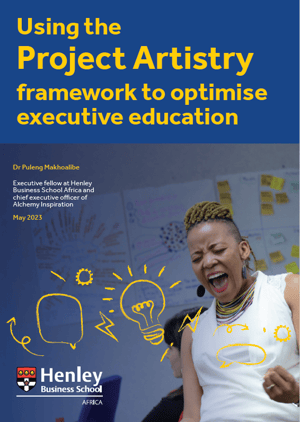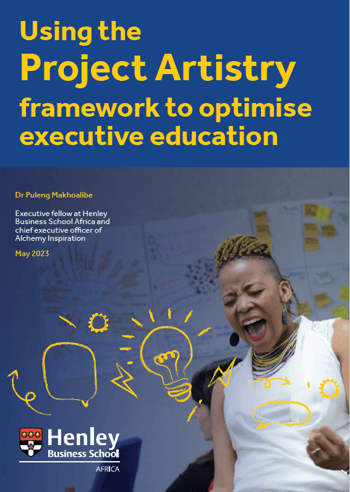White Paper: Using the project artistry framework to optimise executive education
Amidst unparalleled global change and uncertainty, it’s becoming clear that we cannot rely solely on logic to solve problems. How can business schools ignite that spark of creativity, curiosity and courage in the leaders they teach that will allow them to grow as individuals, reach their full potential and unlock new value in the work, their families and their communities?
By: Dr Puleng Makhoalibe

A key part of the business toolkit
This white paper lays down a challenge to business schools: If they hope to continue delivering impactful executive education in a fast-changing and unpredictable world, they must embrace the world of design thinking and creative problem-solving embodied in the project artistry framework. Dr Makhoalibe explores how the human centricity and creativity that these design-based techniques can unlock are increasingly being viewed as the key to unlocking business competitiveness, innovation and long-term sustainability in a volatile and uncertain world.
A gradual evolution
When project artistry was initially envisaged in 2011, it was a hard sell. This was not only because of a long-held scepticism towards design thinking, which forms the core of the approach, from business leaders, but also because the word ‘artistry’ proved a distraction for corporates. The perception that creativity is a cloak for wayward thinking, irrationality and implausibility is not uncommon in business circles. But over the past few years there has been a notable softening of this stance.
Amidst unparalleled global change and uncertainty, it’s becoming clear that we cannot rely solely on logic to solve problems. A balance between logic and imagination is required, coupled with a rigorous process to extract fresh thinking to navigate a world of unknowns.
An approach that works
The project artistry framework has been successfully applied across a range of corporate and executive education programmes both at Henley and more broadly, including the award-winning, 10-day pan-African programme, #unTAP developed by Henley Africa and the Gordon Institute of Business Science for Standard Bank. This is featured as a case study in the white paper.
According to Glen et al. 2014, this suggests that institutions tasked with developing current and future leaders should also embrace thinking that equips leaders with a ‘more exploratory skill set’ that encompasses reasoning, creativity, openness, and willingness to experiment and innovate. The mix of relevant skills and abilities can be developed using a method that draws on design thinking and other decision-making and problem-solving approaches.

